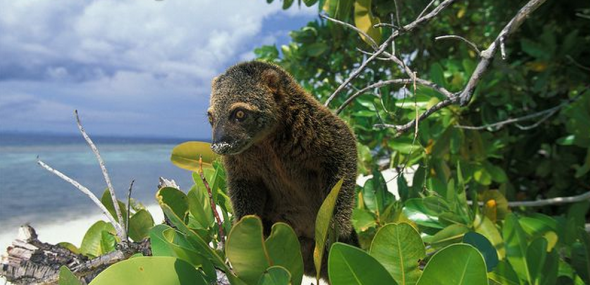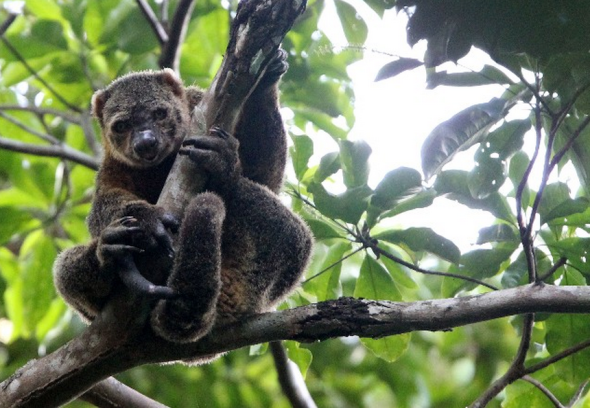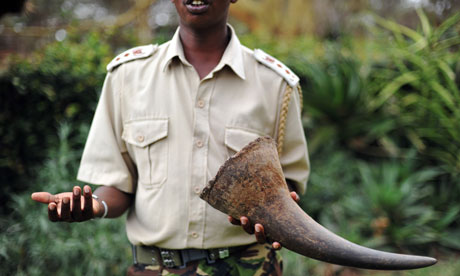Endangered Species Friday: Ailurops ursinus
Endangered Species Friday: Ailurops ursinus
A. ursinis was identified back in 1824 by Dutchman Dr Coenraad Jacob Temminck - (31 March 1778 – 30 January 1858) was a Dutch aristocrat, zoologist, and museum director. Listed as vulnerable the species is endemic to Indonesia on the island of Sulawesi of which there remains limited data on this rather fine specimen of marsupial that resides in the family phalangeridae. (Image: Young Bear cuscus)
Populations of the (Bear cuscus) as its commonly known continue to steadily decline even though there are limited - conservation measures in place protecting the species (There remains as yet no data on population size). The Bear cuscus has practically gone extinct within the Tangkoko-DuaSudara Nature Reserve of which a staggering 95% decline has been recorded within the region alone of which the primary threat within the nature reserve is hunting and trade for pets.
North Sulawesi has also seen a staggering decline identical to the population decreases documented within the Tangkoko-DuaSudara Nature Reserve too. Yet again hunting and the illegal pet trade are very much responsible, and may very well within the next five to ten years lead to a complete extinction occurring.
As much as I myself hate to say it I am pretty certain from viewing statistical data past and present that extinctions are going to occur even sooner than predicted. Should extinctions occur it proves yet again that poaching is having a disastrous effect onto just about every African and Asian species known.
Habitat loss and forest clearance are all playing a pivotal roll at decreasing populations of this beautifully attractive marsupial. As a conservation and botanical scientist sometimes I wonder to oneself why we even bother to help species of animals and flora when some governments show no support, or respect whatsoever in our quest to protect and serve. Then I remember, my children and their children’s heritage is just as important as mine and the teams fight to protect.
Bear cuscus are known as arboreal marsupials meaning, they mostly thrive and spend the majority of their peaceful and playful lives within trees and dense forest. Unfortunately these forests and trees are slowly dwindling in size primarily for land clearance to support local farms and communities and, not forgetting slash and burn activities. I cannot begin to imagine what these creatures think and feel when destructful and greedy humans destroy their homes and pastures. The feeling of not-knowing-when such harm is to be inflicted must be terrorizing for them.
The genus contains the following single species that is known to be related to the Bear cuscus; Ailurops melanotis that inhabits the Salibabu Island listed as (critically endangered) and endemic to Indonesia on the island of Sulawesi. Typically found in undisturbed tropical lowland moist forests, this species does not readily use disturbed habitats, thus it is not usually found in gardens or plantations. It is a largely diurnal and as explained a arboreal species that is often found in pairs. Diet usually consists of a variety of leaves, preferring young leaves, and like many other arboreal folivores it spends much of its day resting in order to digest similar to the Koala bear of Australia.
Image: Bear cuscus relaxing in the canopy of Tangkoko
The only known conservation actions that are taking place are within in few protected areas, that include: Tangkoko-DuaSudara Nature Reserve, Bogani Nani Wartabone National Park, Lore Lindu National Park, Morowali National Park, and a host of forest reserves. This species is nominally protected by Indonesian law. Unfortunately even though the species is protected the illegal pet trade still continues of which I myself have on many occasions located small pet shops in Indonesia selling Bear cuscus from rusty, cramped cages.
Threats
The species is threatened by habitat loss due to clearance of forest for small-scale agriculture and through large-scale logging. It is also heavily hunted by local people for food, and collected for the pet trade. Cuscus hunting forays are often planned before special occasions (e.g., birthday celebrations) in order to provide future guests with the greatly appreciated meat. (These inferences are based on some six months of residence among Alune villagers in 1993–95, which included participation in forest activities and standard ethnographic data collection.)
Thank you reading.
Dr Jose C. Depre
Environmental and Botanical Scientist.
Please donate by clicking the link below and help the board of directors establish their Viet Nam pet and wildlife rescue and rehabilitation clinic today. Without your help we cannot take dogs, cats and small bush meat animals of the streets and into safety. No donation is to small and all donations are greatly and kindly appreciated.
Please donate here:
https://www.facebook.com/SayNoToDogMeat/app_117708921611213
Stay up to date with our SNTDM newsletter:
https://www.facebook.com/SayNoToDogMeat/app_100265896690345
Thank you.
Stay up to date with African and international environmental and animal welfare affairs here:
https://www.facebook.com/pages/International-Animal-Rescue-Foundation-World-Action-South-Africa/199685603444685?fref=ts




